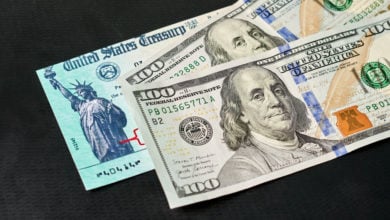The seriousness of the unfolding economic crisis was underlined by two steps taken at the highest levels of the U.S. government after huge declines in U.S. and global stock markets on Jan. 21 and 22 threatened worldwide financial collapse.
On Jan. 22, the Federal Reserve announced a dramatic three-quarters percent cut in the prime interest rate—the
 |
Both the rate cut and the stimulus package are designed primarily to help big business. That should come as no surprise since the Democrats—all pretense about being the “party of the people” aside—as well as Republicans are capitalist parties. Both parties represent first and foremost the interests of the big banks and corporations.
The bright-colored wrapping on the stimulus package is this: most working people who make less than $75,000 per year (individual) or $150,000 (couple) and who pay taxes would get a one-time check ranging from $300 to $1,200, plus $300 for each child. (As this article is published, the package has not yet passed Congress and become law.)
Band-aid solutions
Getting a check in the mail in May or June would be a welcome development, especially for the tens of millions of workers who are increasingly having trouble paying their mortgages, credit card debts and other bills. But what happens the next month?
Deleted from the much-heralded proposal were an extension of unemployment benefits and an increase in food stamp benefits. Unemployment benefits are now limited to 26 weeks—the shortest of any industrialized country. Many laid-off workers are already maxed out on their ludicrously limited benefits—and the recession/depression is just getting underway.
The “stimulus package” is supposed to help the economy by putting additional buying power into the hands of people who, because of their economic situation, likely will spend it quickly. By raising the demand for goods and services—the thinking goes business owners will hire more workers to produce more of what is needed.
But many people—assuming the proposal gets passed—undoubtedly will use the money to pay off credit card or mortgage debt. Regardless of whether the money is spent to pay down debt or buy goods and services, it will end up in the accounts of the banks and other big corporations. In a very real sense, the proposal is a new subsidy to corporate America.
Another $42.3 billion is earmarked for an immediate 50 percent bonus tax deduction on new equipment. Under current tax law, such a deduction for depreciation (wearing out) of equipment would be spread over several years.
The new plan constitutes a huge new tax break for corporations and the rich, which have already received hundreds of billions in tax cuts over the past decade. Smaller businesses would have their limit on expenses that can be written-off doubled—from $125,000 to $250,000 per year—an increase equal to 100 times the amount most two-income working families will receive under the proposal.
There is nothing in the proposed bill for public works projects and jobs. Right now, there is a crying need for the massive rebuilding of the country’s infrastructure. Tens of thousands of bridges need to be replaced or repaired, along with a similar or greater number of schools. New Orleans and much of the Gulf Coast still lies in ruins, two-and-a-half years after the hurricanes hit. Affordable housing and public health clinics are needed in every city, large and small. Millions of jobs with good wages and benefits are needed, which could produce urgently needed goods and services. And the list goes on.
None of that is included in the package agreed to by Bush and Democratic leaders Nancy Pelosi and Harry Reid. Why not? Because those projects, while good for the vast majority of people, would not immediately translate into maximum profits for the capitalists.
Unfolding crisis and its cause
Official unemployment—which does not count the long-term jobless, people in prison or most of the seven million who are in the criminal “justice” system—topped five percent in December 2007. Inflation in 2007 was at its highest level in nearly two decades. Foreclosures on homes rose by 94 percent from the previous year.
Even many bourgeois economists consider the developing crisis to be potentially the most serious since the Great Depression of the 1930s. What none of them publicly recognize or discuss are the real reasons the economy is now contracting. Why are millions of people now facing imminent job and home loss?
Production for profit rather than for need is the underlying and basic cause of the developing economic crisis. Capitalism is a system based not on meeting people’s needs, but making the highest possible profit for the owners of capital—a tiny percentage of the population.
Today, while millions of people are homeless or being kicked out of their homes, there are far more vacant houses and apartments in the U.S. than people who need them. The problem is that the millions who desperately need housing cannot afford to pay the going rate. So, under capitalism, millions of homes sit empty while millions of people go without housing.
Neither the White House nor Congress will lift a finger to address these urgent human needs.
It’s an absurd system—unless you are a capitalist.





